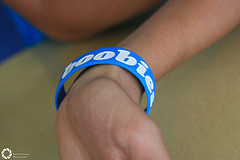“I (heart) boobies” is protected speech under the First Amendment

On August 5, 2013, a federal court in Pennsylvania decided a case* regarding a school’s ban on wearing “I (heart) boobies” bracelets to school. Two students, Kayla Martinez and Brianna Hank went to middle school in the Easton Area School District. “The girls wore their bracelets both to commemorate friends and relatives who had suffered from breast cancer and to promote awareness among their friends. Indeed, their bracelets started conversations about breast cancer and did so far more effectively than the more-traditional pink ribbon” (from the court’s decision).
We have written about these ‘I heart boobies’ cases over the past few years where schools have disciplined students for supporting this breast cancer awareness program. Kayla and Brianna’s case has been going on since 2010 when they and their mothers sued in federal court to protect their daughters’ right to express themselves by wearing the bracelets to school. They were asked during lunch to remove their bracelets and they refused. They were given a 1 1/2 day in-school suspension and prohibited from attending the Winter Ball. This case was argued several times before finally being presented to the full court of fourteen judges in February, 2013. The decision announced on August 5 is the result of a nine to five vote of the court. This is the highest court that has addressed this issue of free speech by students and it could end up before the U.S. Supreme Court soon.
We think it important to present here some of the court’s statements about free speech as applied to students. If you go to a school without a dress code, you probably see all kinds of message clothing, jewelry, patches and buttons. You may have wondered how students get away with some of the things you see. The court’s opinion sheds some light on your freedom of expression in and out of school. The following quotes are taken directly from the court’s ruling and can be seen by going to the following: www.ca3.uscourts.gov and bringing up B.H. v. Easton Area School District. Believe it or not, it makes for interesting reading.
“. . . speech that does not rise to the level of plainly lewd and that could plausibly be interpreted as commenting on political or social issues may not be categorically restricted. Because the bracelets here are not plainly lewd and because they comment on a social issue, they may not be categorically banned . . .”
“If young women see such awareness projects and products as cool and trendy, the thinking goes, then they will be more willing to talk about breast cancer openly.”
“Although “students do not ‘shed their constitutional rights to freedom of speech or expression at the schoolhouse gate,’” the First Amendment has to be “applied in light of the special characteristics of the school environment” and thus students’ rights to freedom of speech “are not automatically coextensive with the rights of adults in other settings.””
“Society also expects schools to “teach students the boundaries of socially appropriate behavior,” including the “fundamental values of ‘habits and manners of civility’ essential to a democratic society.””
In November, 2013, the school district voted to appeal the decision to the U.S. Supreme Court. Then it will be up to the court to either grant or deny the petition for review (called certiorari). On March 10, 2014, the Supreme Court declined to hear the appeal. That means the decision of the Third Circuit remains in place. Wearing the bracelets is constitutionally protected free speech, at least in the states included in the jurisdiction of the Third Circuit (Delaware, New Jersey, Pennsylvania and the Virgin Islands). It is expected to also be lawful in the other states where the issue comes up since the Supreme Court has, by its silence in this case, spoken on the issue.
Update: In October, 2014, the Pennysylvania school district settled the case with Kayla and Brianna agreeing to pay $385,000.00 for their lawyers’ fees over the next year.
*B.H. and K.M. v. Easton Area School District, Third Circuit Court of Appelas (Pennsylvania, August 5, 2013).



